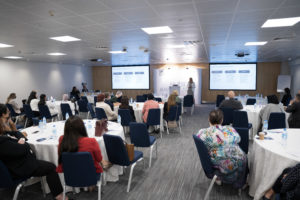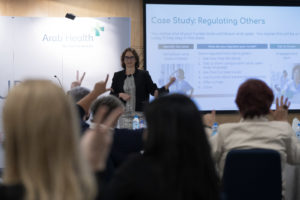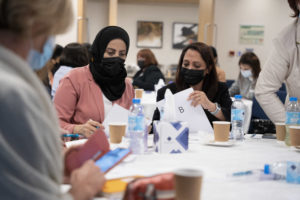Speak up, listen up, follow up
Healthcare leadership unquestionably requires extra talents from the very start of a professional journey, quite aside from the clinical skills being learned. Where safety is an issue in everyday decisions those talents need to be nurtured and grown carefully.
As patient safety remains paramount in all aspects of care, so a major topic of discussion becomes how (and when) concerns can be raised about all aspects of healthcare, including clinical, administrative, operations, and quality (or lack of) communication. And then there’s the question of where they can be raised in a safe manner that secures the privacy of the people concerned and protects their own workplace safety.
The recent 3rd Nurse Leadership Forum Middle East event, held in January in Dubai, UAE, showcased some of the issues involved and encouraged discussion in subjects as diverse (and yet linked) as ‘Freedom to Speak Up’ and ‘Leading With Resilience’.
62-CNOs, Director of Nursing, and other nursing senior professionals were invited to share their experiences, take part in a workshop-driven day with peers, and discuss their own strategies among the public and private hospital sector, from small stand-alone hospitals to multiple-hospital enterprises across regions.
It proved to be an enlightening and engaging day.
 A full house of nurse leader delegates
A full house of nurse leader delegates
 Dr. Henrietta Hughes
Dr. Henrietta Hughes
Communicating openly is a crucial element to the process of discovery, decisions, and outcomes, and as complex organizational structures run across disciplines, seniorities, and authorities, this can make for tricky navigation. It’s no wonder that sometimes it seems easier to listen to an inner voice that says, “not my place to suggest” than to say, “that seems incorrect to me”.
Navigating that conflict all too often causes emotional struggles and can to lead to a crisis of confidence, but also build into organizational imbalance.
Of course, change can be difficult and sometimes slow, but making changes builds momentum, and Dr. Henrietta Hughes shared her experiences in building a ‘Freedom to Speak Up’ culture in one of the world’s largest healthcare systems.
Operating independently of the healthcare system but working within it, the network now has 700+ Freedom to Speak Up Guardians in place, interacting with staff of all disciplines, both clinical and non-clinical, and last year dealt with more than 21,000-cases. Since 2016 they have listened to and acted upon more than 50,000-cases in the system.
All from a standing start.
So although change can take time (much like turning around an oil-supertanker), it is possible but needs to start with a reason.
The background to the reason was a UK Government report which had been established to ascertain failings in one of the National Health Service (NHS) Hospital Trusts in the UK. A previous report by the Healthcare Commission in 2009 had condemned “appalling” standards of care and reported there had been at least 400 more deaths than expected between 2005 and 2008.
It listed a catalogue of failings, including receptionists assessing patients arriving at A&E, a shortage of nurses and senior doctors, and pressure on staff to meet targets.
Later, an independent inquiry chaired by Sir Robert Francis QC found there were failings from the top to the bottom of the NHS. At the time, he said: “This is a story of appalling and unnecessary suffering of hundreds of people,” going on to say, “they were failed by a system which ignored the warning signs and put corporate self-interest and cost control ahead of patients and their safety.”
He said the public’s trust in the NHS had been “betrayed” and a change of culture was needed to “make sure that patients come first” and made 290-recommendations, saying “fundamental change” was needed to prevent the public losing confidence.
In 2016 there was no formal operation in place in the NHS to make cultural changes, and the National Guardians Office was established. The office leads, trains, and supports a network of ‘Freedom to Speak Up’ Guardians in England and conducts speaking up reviews to identify learning and support improvement of the speaking up culture of the healthcare sector.

Guardians ensure workers can speak up about any issues impacting on their ability to do their job. The National Guardian’s Office also provides challenge and learning to the healthcare system as a whole as part of its remit.
It is one of the largest change cultures implemented anywhere. To give an idea of just how important this has been, the NHS is the world’s 2nd largest publicly funded healthcare system (Brazil’s Sistema Único de Saúde, or Unified Health System, is the largest).
In the year 2020/21, the UK government budget for the NHS was £192bn ($261bn), it employed 1.35m people with approximately 50% in clinical roles, in 219-NHS Trusts, across more than 1,230-hospitals and 9,000 GP surgeries providing healthcare to 65m people.
Within 5-years, there were 700-Freedom to Speak Up Guardians (increasing daily), who were involved with 50,000-cases helping clinical staff, support & administrative staff, and patients draw attention to potential issues in the sector.
Henrietta shared, “Through our work, we can now see clear evidence that a strong ‘Freedom to Speak Up’ culture at all levels in healthcare has significant benefits. By creating the network, those workers who might otherwise not have been heard have been supported to speak up.
“When leaders listen and act on speaking up, great improvements can be made. Conversely, when they are defensive or victimise workers who speak up, it has a chilling effect, putting patients and workers at risk of harm. Speaking up has never been more important than during the pandemic, and yet some workers who feared for their safety reported they were let down by leaders who were not listening.
“The majority of cases refer to a problem or an issue where things are not working as well as they might. So, it’s important that leaders both deal with the issue raised, but also apply the learning across the whole of their organisation. Only by taking action can they hope to truly embed the learning gained.
“Speaking up is a gift – use it wisely, and we can change the NHS for the better.”
The keynote encouraged nurse leaders to explore ways of sharing that experience, and 2-workshops followed, which built knowledge, peer-group discussion, and takeaways from the event to bring into the CNOs organisations.
The cultural mix of the leadership was broad and experience deep, from Gulf nationals, western, African, Asian, and South-Asian cultures – and yet the experiences and concerns (and solutions) were 100% aligned.
If there were proof needed that nursing leadership comes not from a geographic culture but from a human culture, this was the evidence. Change comes from need, change comes from inspiration, change comes from vision, and change comes from shared experiences.
The CNOs, DON’s, and nurse leaders clearly had all that, and more, and went on to discuss ‘Leading with Resilience’.
 Laura Aiken
Laura Aiken
In the second keynote of the day, followed again with practical workshops, the delegates explored the ‘3-zone stress model’ and strategies for personal resilience and leading resilient teams.
Making resilience a habit, using techniques in ‘bottom up’ (body), ‘top down’ (mind), and ‘relational’ (social) theories, the theories were translated into practice using applied methods which can be easily transferred into the healthcare workplace.
Neatly dovetailing with the morning session Laura covered psychological safety as a key component of resilient teams, and how to grow a culture of trust and inclusion.
As Laura stated, “People feel safe to speak up, to offer ideas, and to ask questions and challenge others when they feel safe. The organisation can see the benefits, the individual feels the benefits and, ultimately, everyone involved gains from the experience”.
The overarching theme of the day was to encourage the unlocking of knowledge and experience amongst co-workers in a manner that builds trust, enhances experiences and shows growth in an organisation.
And where safety is an issue in everyday decisions, the results are there to see.
 Workshops throughout the day encouraged engagement
Workshops throughout the day encouraged engagement
The 4th Nurse Leadership Forum Middle East is being discussed at the next Steering Group of the CNOs and nurse leaders in Q2 and will undoubtedly deliver more growth for knowledge because all 3-events to date have been driven by the experiences of those nurse leaders in the region.
To the nurse leaders, we thank you, and to all who might benefit from the knowledge imparted, we hope you take these ideas back into the hospitals and healthcare facilities you run.
And, finally, thanks to Dr. Henrietta Hughes OBE (yes, indeed Henrietta’s leadership of the National Guardians Network resulted in recognition from the UK ‘for services to the NHS’) and Laura Aiken for their kindness, commitment, and knowledge, and for choosing to share that with our group.
Neil Wood, Regional Director, OBIX Middle East